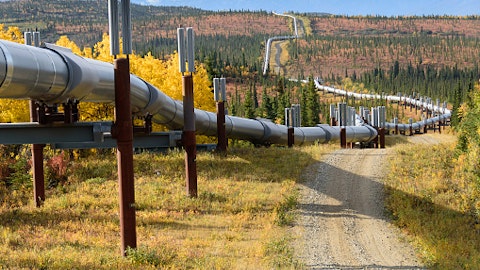Sunoco LP (NYSE:SUN) Q3 2023 Earnings Call Transcript November 1, 2023
Sunoco LP beats earnings expectations. Reported EPS is $2.95, expectations were $1.11.
Operator: Greetings, and welcome to Sunoco LP’s Third Quarter 2023 Earnings Conference Call. At this time, all participants are in a listen-only mode. A question-and-answer session will follow the formal presentation. [Operator Instructions]. As a reminder, this conference is being recorded. I would now like to turn the conference over to your host, Scott Grischow, Senior Vice President of Finance and Investor Relations. Thank you. You may begin.
Scott Grischow: Thank you, and good morning, everyone. On the call with me this morning are Joe Kim, Sunoco LP’s President and Chief Executive Officer; Karl Fails, Chief Operations Officer; Dylan Bramhall, Chief Financial Officer; and other members of the management team. Today’s call will contain forward-looking statements that include expectations and assumptions regarding the partnership’s future operations and financial performance. Actual results could differ materially, and the partnership undertakes no obligation to update these statements based on subsequent events. Please refer to our earnings release as well as our filings with the SEC for a list of these factors. During today’s call, we will also discuss certain non-GAAP financial measures, including adjusted EBITDA and distributable cash flow as adjusted.
Please refer to the Sunoco LP website for a reconciliation of each financial measure. The third quarter brought a continuation of Sunoco’s strong financial performance throughout 2023. The partnership generated adjusted EBITDA of $257 million compared to $276 million a year ago. Fuel volumes for the quarter were 2.1 billion gallons, up 7% from the third quarter of last year. Fuel margin on all gallons sold was $0.13 per gallon compared to $0.139 per gallon a year ago. Total third quarter operating expenses were $141 million, an increase of $10 million from the same period last year. This year-over-year increase was attributable to the Peerless and Zenith acquisitions. During the third quarter, we spent $31 million of growth capital and $14 million in maintenance capital.
Third quarter distributable cash flow as adjusted was $181 million compared to $196 million in the third quarter of 2022, yielding a current quarter coverage ratio of 2x and a trailing 12-month coverage ratio of 1.9x. On October 20th, we declared an $0.842 per unit distribution consistent with last quarter. As you may recall, we increased our distribution by 2% in the first quarter of 2023, and we will determine our next distribution increase next year in the first quarter. Turning to the balance sheet. At the end of the third quarter, we had $647 million outstanding on our revolving credit facility leaving approximately $847 million of liquidity. Leverage at the end of the quarter was 3.9x. In September, we completed an offering of $500 million of 7% senior notes due 2028.
We used the net proceeds from the offering to repay a portion of the outstanding borrowings on our revolving credit facility. This notes offering not only improved our liquidity position, but it also allowed us to achieve a savings in interest expense given the difference between the current cost of borrowing on the revolving credit facility and the fixed rate on the new notes. Finally, as a result of our strong performance year-to-date and our outlook for the remainder of the year, we are increasing our EBITDA guidance for the full-year 2023 to be above $935 million. This represents a $20 million increase to the top end of the revised guidance range we issued in May, further demonstrating our ability to continue to grow cash flow year-after-year in any environment.
The reliability and free cash flow generation of our operations allows us to remain consistent in our capital allocation strategy and focus on our three pillars. First, to maintain a secure distribution with annual growth; second, to protect our balance sheet; and third, to pursue disciplined investment in growth opportunities. We are confident that this framework will continue to deliver strong returns to our unitholders. With that, I will now turn the call over to Karl to walk through some additional thoughts on our third quarter performance.
Karl Fails: Thanks, Scott. Good morning, everyone. We delivered another strong quarter, supported by continued strength in margins, volume growth, expense discipline, efficient operations and accretive acquisitions. When you step back and look at our business, it continues to perform quarter-after-quarter. The fundamentals are sound. We have put ourselves in a solid financial position, and we have the strategies to take advantage of market opportunities. Our volumes this quarter were up about 7% versus the third quarter of last year. The continued growth in volume relative to prior years comes from the contribution from our capital deployed, both organic and through acquisitions, as well as demand growth in some geographies.
This quarter marks the highest volume quarter in our history and the second consecutive quarter where our volumes were above the $2 billion gallon mark. When you compare this to various reports on U.S. demand, it is clear that we are outpacing the sector and picking up market share. Another sign that our growth is delivering tangible results. This is all occurring as we grow in our existing geographies and enter new markets. As we look to the end of the year, we expect that volume in the fourth quarter would see a normal seasonal decline sequentially, but our relative position in the market will remain strong. With respect to margins. The strong margin performance over the last few years continued in the third quarter as we delivered margins of $0.13 per gallon.
There is no extraordinary story to share for this quarter. The continued combination of increased market volatility, higher break even margins and our gross profit optimization strategies delivered strong margins even with some rising prices of first half of the quarter. Looking forward to the fourth quarter, we expect the same fundamental factors to remain in place. However, just like with volume, our margins are often seasonally lower when compared to the third quarter. Even with some variability quarter-to-quarter, as we have said many times, when you look at our business over a full-year period, we continue to deliver strong and growing results. I want to briefly touch on the devastating wildfires experienced on the island of Maui in August.
We have three sites that were impacted by the fires, and clearly, there has been some additional business impact as a result of reduced travel to the island. Though overall, it is not material to our results. More importantly, we are very grateful that all our employees are safe, though many of them experienced dramatic impacts to their homes and families. We are extremely proud of our team in Hawaii and how they have been able to pivot from worrying about the impacts on their own lives and livelihoods and find ways to help their neighbors and contribute to the community response. Thank you to all of them. Turning to expenses. Consistent discipline in managing our expenses remains one of our core strengths, and our third quarter results firmly demonstrate that as they were basically flat to the second quarter.
Even with the increase in our EBITDA guidance for the full-year, we expect our expenses to be in the range that we shared in May. Moving on to maintenance and growth capital. Both of these also remain in line with our revised 2023 guidance we provided in May. If we look at our overall growth profile, we have deployed approximately $1.3 billion of growth acquisition and working capital since the beginning of 2021. Our growth strategy has been focused on adding fuel distribution in midstream assets. On the acquisition side, we’ve been able to identify businesses that fit into our strategy and execute on those results. We find businesses where we can add value to the fuel supply chain, grow volume, reduced supply costs or expand margin. We optimize expenses and utilize our balance sheet and capital discipline to invest in the acquired businesses in ways that unlock value.
We look at integrating our fuel distribution business with midstream assets, even where that might appear to be a step out like our Transmix or Puerto Rico acquisitions at the core, the strategy is the same. I already talked about how we are growing our fuel volume. We are also now one of the largest refined product terminal operators in the United States and the largest Transmix operator. These represent high quality infrastructure assets that will continue to have value for decades to come in any energy transition scenario, while also supporting our growing fuel distribution portfolio. Simply put, our acquisitions and subsequent operational results speak for themselves. Before turning the time over to Joe, I will end on this. Sunoco remains a growth company.
I talk a lot about the stability of our base business, the strong market foundation, our expense discipline and gross profit optimization. Ultimately, those are all tools that both deliver results in our current business and enable us to continue to grow. We will do that through investing in high-return organic projects and focusing on making accretive acquisitions at attractive transaction multiples, which will deliver immediate results for our stakeholders and ultimately drive continued appreciation in our unit price. Joe?
Joseph Kim: Thanks, Karl. Good morning, everyone. We delivered a very strong third quarter. Although 2023 is not quite over, I want to provide some perspective on this year as a whole. On a macro level, fuel distribution has remained highly attractive within the energy sector. The combination of higher breakeven margins and commodity volatility has supported strong earnings for select companies that can optimize gross profit and manage expenses. Obviously, this is what Sunoco does well. In addition, our growth in the terminal business has enhanced our overall portfolio, providing further stability and growth opportunities. As a result, we’re on pace for another record year. As Scott mentioned, we increased our EBITDA guidance for the full-year 2023.
We expect more of the same in 2024. This December, we will provide a new investor presentation, which will include our formal 2024 guidance and business outlook. I’d like to preview a few key themes. We expect to grow and have another strong year in 2024. We expect industry fundamentals to remain supportive, and we expect the continuation of our proven track record of optimizing our business in various macro environments. Regardless of one’s outlook on fuel demand, inflation recession risk, and geopolitical uncertainty, we expect our stable portfolio to deliver strong results in various environments. With our increasing cash flow, we expect to grow both organically and through acquisition, the opportunity set remains ample and attractive. And finally, we’re in a position to increase our distribution again next year.
All of this while maintaining strong coverage and leverage ratios. Operator, that concludes our prepared remarks. You may open the line for questions.
See also Top 20 Cloud Computing Companies in USA and 25 States With The Highest Obesity Rates in America.
Q&A Session
Follow Sunoco Inc (NYSE:SUN)
Follow Sunoco Inc (NYSE:SUN)
Receive real-time insider trading and news alerts
Operator: Thank you. At this time we’ll be conducting a question-and-answer session. [Operator Instructions]. Our first question comes from Theresa Chen with Barclays.
Theresa Chen: Good morning. Thank you for taking my questions. I wanted to go back to the comments about Sunoco being and remaining a growth company. Karl, to your comments about gaining market share in these tumultuous volatile markets. Can you talk about if this is primarily driven by the acquisitions? Or how have you been able to organically grow market share?
Karl Fails: Yes, Theresa, thanks for the question. And if you think about the components and kind of the contributions to our market share growth, I think you hit on the two biggest. So from an acquisition standpoint, clearly, the biggest difference in volume this quarter — third quarter this year versus third quarter last year is our acquisition of Peerless at the end of last year. But in addition, there are investments that we’ve made both in growth capital, and I’d say generically in working capital in growing our business. And that’s signing new customers to long-term agreements, and then I think finding opportunities to take advantage of market demand, whether that’s through consolidating our supply and selling that through various wholesale channels and coupling that with additional branding growth where we spend growth capital.
So it’s really a combination of both of those. I’d say probably a little more towards the acquisitions, but I would not discount the growth that we’ve had coming from the investments in growth capital and working capital.
Theresa Chen: Got it. And on the M&A landscape, can you talk about what you’re seeing as far as evolution of valuation assets coming to market that you’re interested in? How is that changing? And particularly to Midstream assets outside of wholesale distribution on the infrastructure side, are there opportunities where it makes sense to invest along with your parent?
Joseph Kim: Hi, Theresa, this is Joe. Assessing the M&A landscape, I would probably put it this way. I know for probably for the last two or three years, I’ve said pretty much the same thing that the opportunities out there looks robust. Looking forward, probably to this year and to next year, I would expect it to be exactly the same or maybe even better. So the situation that we’re in right now is I think people like Sunoco with a strong balance sheet, we bring synergies to the table. I think we’re very well situated whenever opportunities come up. And trying to separate out between fuel distribution and midstream. We like both sectors. And some of the acquisitions we’ve done actually is not one or the other, it’s actually both.
So we’re equally interested in both. I think if there’s an opportunity that pops up Sunoco alone or with Energy Transfer, we’re in a really good position to take advantage of that. And when the right opportunity comes up, we’ll take advantage of it.
Theresa Chen: Thank you.
Operator: Our next question comes from Spiro Dounis with Citi. Please proceed with your questions.
Spiro Dounis: Thanks, operator. Good morning, team. Joe, I want to come back to your comment around the distribution increase. You sound pretty constructive once again as we head into next year. And so just wondering if you could remind us some of the factors that you and the Board will be looking at when you determine what the right size of that distribution increase could be?
Scott Grischow: Hey Spiro, this is Scott. I’ll take that one and maybe Joe can follow up if necessary. But I think there’s really three factors primarily that come into play when we evaluate the distribution and increases moving forward. And those are really staying true to our capital allocation strategy, right? We want to ensure surety of the distribution moving forward. We want to continue to protect the balance sheet and operate at or below our long-term leverage target. And we want to be in a continued position to grow the company. So I think those are the three primary factors. And then subsequent to that, I think we want to ensure ongoing growth opportunities in the distribution, right? So sizing it to where each year, we can continue to evaluate future growth opportunities and distribution increases.




